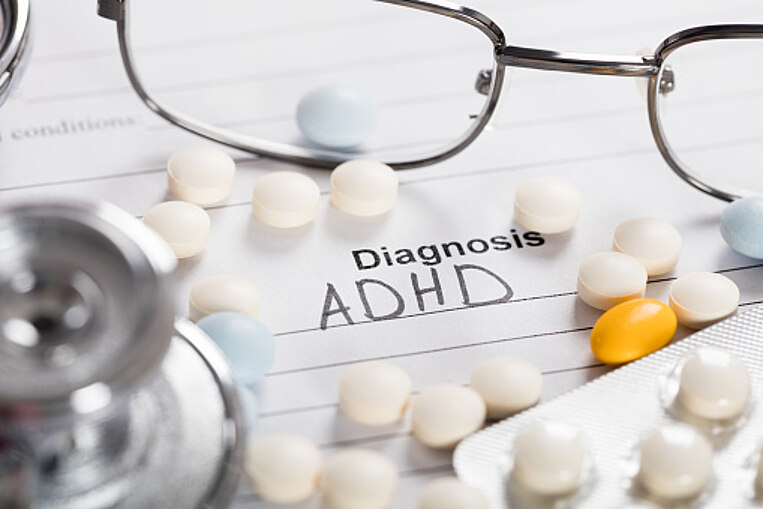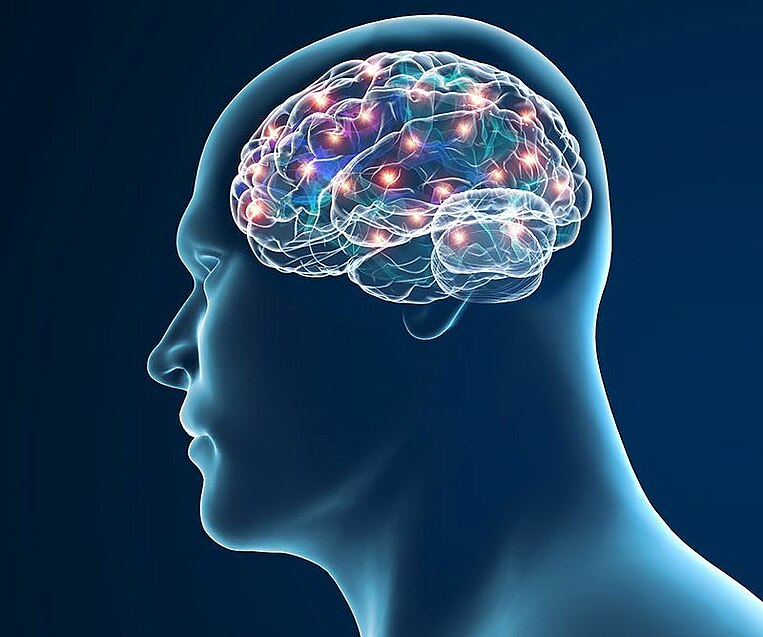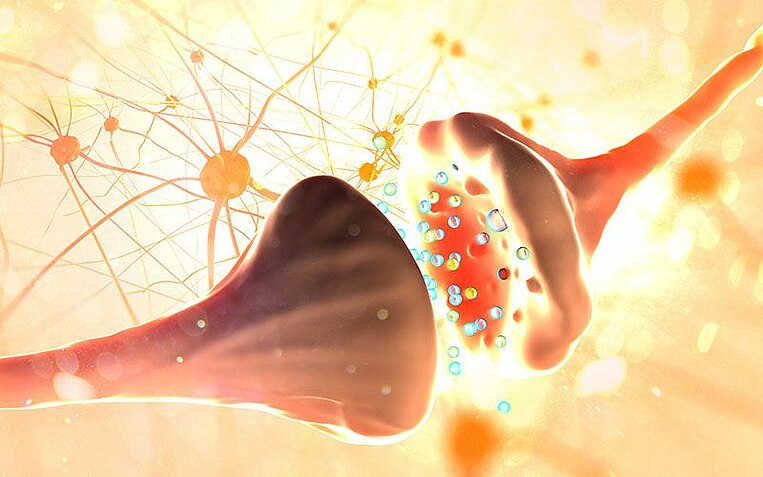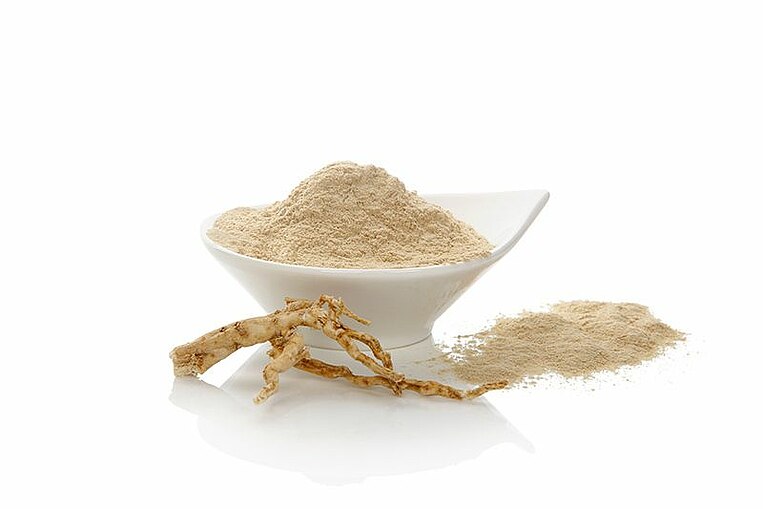Attention deficit hyperactivity disorder (ADHD) affects both adults and children. The typical symptoms are reduced attention span, difficulty concentrating, and impulsiveness. A number of micronutrients are able to improve nerve function and relieve the symptoms of ADHD. Find out here how these substances are applied in micronutrient medicine.

Causes and Symptoms
Attention deficit hyperactivity disorder (ADHD) causes reduced attention span in those affected. Typical symptoms are difficulty concentrating and forgetfulness. Those affected are easily distracted and react very impulsively. Reduced mental performance, slower reactions, and mood swings are also signs of the condition.
The first signs of ADHD are first seen at the age of six and after. Babies with ADHD may show signs of sleeping problems or restlessness. The typical signs of ADHD in young children are hyperactivity, tantrums, and delayed motor development. Children with ADHD are often disruptive at school. They behave in a very chaotic manner. During puberty, ADHD can trigger anxiety and/or depression. The symptoms of ADHD can improve with age. It is estimated that 30 to 50 percent of those affected still have symptoms as adults. As a result of their ADHD, many adults may suffer problems in their job or in their relationships
Info
There are numerous SDHD tests or self-tests online which can help identify if a child or adult is showing possible signs of ADHD. If someone is suspected of having ADHD, this can only be confirmed with a diagnosis by a qualified physician.
Attention deficit disorder, without the hyperactive component, also exists. This is known as ADS.
The cause of ADHD and ADS has not been definitively determined. Doctors suspect that it is due to impaired signal transmission in the brain. The core elements are the neurotransmitters such as dopamine, noradrenaline, or serotonin, which influence the transmission of signals between the nerve cells. These processes are impaired in the brains of people with ADHD.
Why this happens is not yet fully known. It is likely that there are a number of factors which contribute to the development of ADHD:
Genetics: ADHD is hereditary so it can be passed on from parents to children. Certain genes can play a role in the metabolic disturbances in the brain.
Pregnancy: Children are at greater risk of ADHD if their mother drank alcohol, smoked, used drugs, or certain types of medications, for example, asthma or antipsychotic medication during pregnancy. Additionally, bacterial or viral infection during pregnancy can also play a role.
Inflammation: If a child has a genetic predisposition to develop ADHD, then inflammatory processes in the body can aid the triggering of the disease. Researchers believe that the immune system plays an important role in the development of SDHD because those with ADHD often suffer from other illnesses such as allergies, neurodermatitis, or asthma.
Nutrition: There is evidence that the wrong diet can aid the development of ADHD, for example, low levels of omega-3 and omega-6 fatty acids along with zinc- and magnesium deficiencies.
Aim of the treatment
What is the standard treatment for ADHD?
ADHD is incurable. Treatment of ADHD in children and adults aims to reduce the severity of the symptoms and their consequences. ADHD therapy is made up of various elements: Psychotherapy and behavioral therapy both play an important role in the treatment of ADHD by helping those affected learn strategies to help them deal with their ADHD. Developmental disorders are treated using specialized supportive measures, logotherapy, and ergotherapy. The treatment of ADHD also includes the administration of medication, in most cases, this contains the active substance methylphenidate, and in certain cases, amphetamines (e.g., dexamphetamine, or lisdexamphetamine) are administered. These medications are psychostimulants and increase the effect duration of the neurotransmitters dopamine and noradrenaline. In turn, this increases the ability to concentrate as well as perception and learning ability.
The aims of micronutrient medicine
Micronutrient medicine ensures that brain metabolism has all the vitamins and minerals it requires to function correctly. Some plant substances (phytochemicals) can also help improve cognitive performance and can therefore help relieve the symptoms of ADHD. Recommended are:
- Omega-3 fatty acids for the development, function and protection of the nerve cells
- Zinc promotes the effect of activating neurotransmitters and protects the nerves from the effects of oxidative stress.
- Magnesium for energy production and nerve signals
- Vitamin B6 reduces the symptoms of ADHD.
- Ginseng and Ginkgo to help improve attention and memory
Treatment using micronutrients
Omega-3 fatty acids increase neural (nerve) activity.
How omega-3 fatty acids help with ADHD
The brain and nervous system require omega-3 fatty acids, especially docosahexaenoic acid (DHA) and eicosapentaenoic acid (EPA) to function optimally: DHA plays an important role in the construction of the membranes of the nerve cells and in brain function – it is an important element in learning and concentration. People suffering from ADHD often have lower levels of omega-3 in their blood. Reviews of the currently available studies show that taking omega-3 fatty acids leads to a notable improvement of ADHD symptoms. The higher the EPA dosage, the greater the improvement.
In a direct comparison with ADHD medication, it was shown that taking omega-3 fatty acid was up to 40% as effective as methylphenidate. However, the side-effects of omega-3 fatty acids were far less pronounced.
Omega-3 fatty acids also have anti-inflammatory properties. They curb those inflammatory processes in the body which, in the presence of a genetic predisposition, could trigger an outbreak of the disease. There is also evidence that omega-3 fatty acids reduce oxidative stress, which is a common symptom of ADHD.
Omega-3 Fatty Acids: Dosage and recommended use in the treatment of ADHD
Micronutrient experts recommend for the treatment of ADHD in children between 500 and 2,000 milligrams of fish oil daily which contains omega-3 fatty acids (EPA/DHA). Products with a high EPA percentage are especially effective (560 milligrams). For adults, up to 5,000 milligrams of omega-3 fatty acids per day can be used.
Fish oil tablets or capsules should be taken at mealtimes. This enables them to be easily absorbed into the bloodstream.
You should pay special attention to the quality of the fish oil, and use only products with high levels of purity that are free of unwanted residual substances, such as heavy metals (e.g., mercury) and pollutants.
Omega-3 level can be determined by laboratory tests.
The omega-3 index is then used to determine omega-3 levels. Blood tests are used to identify the EPA and DHA level in the red blood cells. Five percent means that five of every hundred fatty acids in the blood cells are omega-3 fatty acids. Ideally, the index should confirm a level of eight percent, although the average is between five and eight percent.
Care should be taken while using blood-thinning medication.
Omega-3 fatty acid has blood-thinning properties. This may result in the need for reduced dosages of blood-thinning medications. When using blood-thinning medication and omega-3 preparations exceeding 1,000 milligrams per day, blood coagulation values should be tested regularly. Your doctor will adjust the dosage of the blood-thinning medication if necessary.
People with blood coagulation disorders should avoid using omega-3 preparations.
Zinc optimizes the effectiveness of neurotransmitters.
How zinc works in the treatment of ADHD
Zinc plays a role in both brain and neural function. It aids the regulation of activating the neurotransmitter dopamine. A zinc deficiency makes the brain more susceptible to oxidative stress, which is common in those with ADHD. Oxidative stress damages the nerve cells. Scientists suspect that this also plays a role in the behavioral disorders associated with ADHD.
Children with ADHD often have lower zinc levels than healthy children. There is also evidence that zinc levels stand in direct correlation to the severity of ADHD symptoms. Initial clinical studies have shown that the intake of zinc preparation can have a positive effect in the treatment of ADHD - both a sole therapeutic application as well as in conjunction with the ADHD medication methylphenidate.
Overall, some, but not all, medical studies on zinc showed positive results. Zinc is being discussed as a promising treatment option in regions with low zinc intake levels.
Zinc: Dosage and recommended use in the treatment of ADHD
For the treatment of ADHD, a daily dosage of between 10 and 25 milligrams of zinc is recommended. Organic zinc compounds, such as zinc citrate and zinc gluconate are ideal. These are easily absorbed by the intestines.
Zinc should also be taken at mealtimes. This improves not only the zinc uptake in the body, but also makes it easier for the stomach to tolerate.
Precautions for Kidney diseases
In the event of chronic kidney insufficiency or other kidney diseases, no additional zinc mineral supplements should be used. Weakened kidneys are unable to remove zinc normally and this increases the level of zinc in the blood.
Magnesium improves signal transmission.
How magnesium works in the treatment of ADHD
There is evidence that mineral deficiencies can aid the development of ADHD. Minerals are needed to help the body produce optimal functioning messenger substances. In particular, magnesium plays an important role in the transmission of dopamine and serotonin in the brain, which is impaired in those with ADHD. Magnesium is also necessary for energy metabolism and promotes healthy blood circulation.
ADHD patients often suffer from magnesium deficiency. However, the effectiveness of magnesium preparations has not been scientifically proven. Although, initial studies over a period of two to six months did produce positive results. The effects of magnesium must now be subject to comprehensive studies The targeted supplementation of magnesium can be a sensible and promising treatment for magnesium deficiencies.
Magnesium: Dosage and recommended use in the treatment of ADHD
Consult your doctor for the correct dosage for children. The rule of thumb is: Approximately 6 milligrams of magnesium for every kilogram of bodyweight. For a bodyweight of 35 kilograms, this means a daily dosage of 200 milligrams.
Micronutrient medical specialists recommend a daily dosage of at least 200 milligrams daily for adults.
Tips
Increased magnesium intake can cause diarrhea; to combat this you should take smaller doses of magnesium at mealtimes throughout the day. An adult should not take more than 250 milligrams a day without medical supervision.
Magnesium level can be determined by laboratory tests.
To determine magnesium levels, the amount of magnesium in whole blood is tested. Normal levels are considered to be between 1.38 and 1.5 mmol of magnesium in every liter of blood. A level below 1.38 mmol/l points indicates a deficiency.
Instructions if taking other medications or if suffering from kidney disease
ADHD medication containing dexamphetamine can cause an increase in magnesium levels in the blood. Magnesium should not be used as a long-term supplement without blood testing.
Vitamin B6 relieves symptoms.
How vitamin B6 works in the treatment of ADHD
Vitamin B6 plays an important role in nerve cell metabolism, especially energy metabolism or the functioning of the neurotransmitters dopamine and serotonin. Many adults with ADHD were found to have a vitamin B6 deficiency: The more the severe the deficiency, the more pronounced were the ADHD symptoms.
Preliminary studies have shown when children and adults were given a targeted course of vitamin B6 their serotonin levels normalized and their attention problems due to ADHD improved.
However, further study is required to determine if vitamin B6 improves the symptoms of all those affected. Regardless, ADHD sufferers should ensure that they have a sufficient vitamin B6 intake to avoid developing a deficiency.
Vitamin B6: Dosage and recommended use in the treatment of ADHD
For children with ADHD, micronutrient medicine recommends up to 15 milligrams of vitamin B6 per day. This dosage is calculated based on bodyweight. 0.6 milligrams of vitamin B6 per kilogram of bodyweight. Adults should use at least 15 milligrams of vitamin B6.
Tips
Vitamin B6 works together with other micronutrients in the serotonin production process. Therefore, Vitamin B6 should be taken as a combination preparation together with zinc and magnesium.
Care should be taken during pregnancy and when taking medication for epilepsy.
Although a sufficient intake of vitamin B6 during pregnancy is important, you should use high-dosage supplements during pregnancy or when breastfeeding only if a deficiency has been diagnosed. Consult with your gynecologist beforehand.
In high doses (5 milligrams), vitamin B6 can reduce the effectiveness of epilepsy medication. The affected active substances include phenobarbital and phenytoin. If using one of these medications, ensure that you are not taking more than 5 milligrams of vitamin B6 per day.
Ginseng increases neural function
How ginseng is used in the treatment of ADHD
The active substance of ginseng root is called Ginsenoside. These plant substances (phytochemicals) can have numerous positive effects on the nervous system: They help improve memory, the ability to learn, and attention span. Ginsenosides increase the levels of the neurotransmitters dopamine and noradrenaline in the brain and can therefore improve the symptoms of ADHD.
A small study showed that children with ADHD who took ginseng preparations over the course of several weeks showed an improved attention span and were less hyperactive compared to patients who were given a placebo.
Ginseng: Dosage and recommended use in the treatment of ADHD
A daily dose of between 1,000 and 2,000 milligrams of ginseng extract is recommended. The initial studies found red Korean ginseng to be particularly effective (Panax Ginseng). Ginseng extract should be taken during mealtimes.
Ginseng extract is only recommended for children ages twelve and up. Initial studies have been carried out where children over six years old were given ginseng. You should consult your doctor or pediatrician before administering ginseng to children. Using ginseng longer than eight weeks has not been studied.
Ginseng: Care should be taken during pregnancy, when breastfeeding, when taking medications, and during illness.
There are no sufficient studies on the use of ginseng in pregnancy and breastfeeding. Talk to your gynecologist before taking ginseng.
Ginseng can reduce the effectiveness of coumarin anticoagulants containing the active substances phenprocoumon or Warfarin. When using ginseng and these types of medication, the blood coagulation values should be tested regularly. Ginseng use should be ended before a planned surgery due to the risk of hemorrhage. Those with blood coagulation disorder should not use ginseng supplements.
Ginseng can also amplify or reduce the effect of certain medications. Ginseng inhibits enzymes in the liver which would normally metabolize medications. If you are on a regular dosage of medication, then consult with your doctor before taking ginseng.
Ginseng should also not be used if suffering from the following: High blood pressure, heart disease, or hormone-dependent tumors. Ginseng may also reduce blood sugar levels, therefore those with diabetes should have their blood sugar level checked regularly when taking ginseng.
Ginkgo increases attentiveness
How ginkgo works in the treatment of ADHD
The leaves of the ginkgo tree (Ginkgo biloba) contain secondary phytochemicals (Ginkgolides), which, among other things, promote the function of neurotransmitters in the brain, and are important for attention, memory and learning.
As a result of these characteristics, gingko extract is used in the treatment of dementia. But this plant substance can be beneficial to those with ADHD: An initial study showed the quality of life, amount of hyperactive behavior and other ADHD-related symptoms in children improved during use. 20 children with ADHD were given a ginkgo biloba preparation of a dosage of 240 milligrams per day over the course of several weeks. A further study compared ginkgo with the ADHD active substance methylphenidate: Both preparations were effective, but ginkgo notably less so. However, methylphenidate produced side-effects such as loss of appetite, headaches, and sleeping problems were most common. Ginkgo could offer an alternative with fewer side-effects.
Overall, there are the initial signs that ginkgo could be effective for ADHD. However, the actual benefit for the patient must now be assessed in larger studies.
Ginkgo: Dosage and recommended use in the treatment of ADHD
For the treatment of ADHD, dosages of 60 to 240 milligrams per day of ginkgo extract, containing up to 8 milligrams of ginkgolides, are recommended The administration of ginkgo to children should be discussed with a pediatrician beforehand.
In rare cases, side-effects such as vertigo (dizziness), headaches, abdominal pains, nausea, and diarrhea may develop. Increased hyperactivity, aggressiveness, tiredness, and sweating have been observed.
Tips
Pay particular attention to the quality of your ginkgo preparations: Ginkgo naturally contains ginkgolic acids. These can be harmful when taken in large amounts. Therefore, you should only purchase ginkgo extract products which do not exceed 0.0005 percent ginkgolic acids.
Gingko: Care should be taken during pregnancy, when breastfeeding, taking medications, and during illness
Ginkgo preparations should not be used when pregnant or breastfeeding.
Ginkgo can increase the propensity for bleeding. If you suffer from a coagulation disorder, are due to undergo surgery, or are using coagulation inhibitor medication containing the active substances phenprocoumon or Warfarin  then you should avoid the use of ginkgo supplements.
Ginkgo can also reduce the effectiveness of medications for high blood pressure which contain the active substance nifedipine. If you are currently using this type of medication, then you should avoid the use of ginkgo supplements.
Ginkgo is suspected of possibly triggering seizures in those with epilepsy. Therefore, it is recommended that those suffering from epilepsy do not use ginkgo preparations.
Dosage overview
Daily micronutrient recommendation for ADHD | |
|---|---|
Vitamins | |
Vitamin B6 | 0.6 milligrams per kilogram of body weight (mg/kg) |
Minerals | |
Zinc | 10 to 25 milligrams |
Magnesium | 6 milligrams per kilogram of body weight (children) 200 to 1,000 milligrams (adults) |
Other Substances | |
Omega-3 fatty acid (with a EPA content) | up to 2,000 milligrams (children) up to 5,000 milligrams (adults) |
Ginseng extract | 2,000 milligrams |
Ginkgo extract | 60 to 240 milligrams |
Laboratory blood test overview
Recommended Laboratory Tests for ADHD | |
|---|---|
Normal values | |
Omega-3 Index: Mean value Optimal |
5 to 8 percent 8 to 11 percent |
Magnesium (Whole blood) | 1.38 to 1.5 millimoles per liter (mmol/l) |
Supporting the effects of medication with micronutrients
Vitamins and minerals improve the effectiveness of methylphenidate
There are numerous micronutrients which support the effectiveness of methylphenidate in the treatment of ADHD and can help reduce the level of medication intake:
In an initial study, combination preparations were shown to be more effective: The simultaneous intake of zinc, calcium and magnesium along with methylphenidate was shown to improve the attention span to a higher degree than when methylphenidate was administered with a placebo.
A further preliminary study showed that the ADHD symptoms of those patients who were given 2,000 International Units of vitamin D and methylphenidate were notably better than those in the group who were not given Vitamin D. The control group was given methylphenidate and a placebo.
The following micronutrients are recommended to boost the effect of ADHD medication containing methylphenidate: 2,000 International Units of vitamin D, 10 to 20 milligrams of zinc, at least 300 mg of calcium and 6 milligrams of magnesium per kilogram of bodyweight.
Dosage overview
Daily micronutrient recommendations when taking methylphenidate medication | |
|---|---|
Vitamin D | 2,000 International Units (IU) |
Magnesium | 6 milligrams per kilogram of body weight (mg/kg) |
Calcium | at least 300 milligrams |
Zinc | 10 to 20 milligrams |
Summary
Children and adults who suffer from attention deficit hyperactivity disorder (ADHD) have problems paying attention: Those affected are easily distracted, have problems concentrating, and have issues with their memory. The condition without the hyperactivity component is known as ADS (Attention Deficit Syndrome).
The cause of ADHD and ADS has not been definitively determined. Genetic predisposition plays a role, but factors such as drinking alcohol, taking medication during pregnancy, inflammation, and poor dieting can aid in triggering ADHD.
Micronutrient medicine uses nutrients which help improve neural function and reduce the symptoms of ADHD. The body requires omega-3 fatty acids for the production and function of nerves Zinc optimizes the metabolic processes of the neurotransmitters and magnesium promotes energy production and signal transmission in the brain. Vitamin B6 is necessary for the production of neurotransmitters and also reduces ADHD symptoms. Plant substances (phytochemicals) from ginkgo and ginseng increase attentiveness.
The effectiveness of the ADHD active substance methylphenidate can be improved with micronutrients: When taken in combination with zinc, magnesium, calcium and vitamin D, methylphenidate has been shown to be more effective.
Study and Source Index
Ahn, J. et al. (2016): Natural Product-Derived Treatments for Attention-Deficit/Hyperactivity Disorder: Safety, Efficacy, and Therapeutic Potential of Combination Therapy. Neural Plast. 2016; 2016: 1320423. https://www.ncbi.nlm.nih.gov/pmc/articles/PMC4757677/, retrieved on: 2018-05-23.
Arbeitsgemeinschaft der Wissenschaftlichen Medizinischen Fachgesellschaften (2011): Leitlinie Diagnostik und Therapie von Aufmerksamkeitsstörungen bei neurologischen Erkrankungen. Im Internet http://www.awmf.org/uploads/tx_szleitlinien/030-135l_S2e_Aufmerksamkeitsst%C3%B6rungen_Diagnostik_und_Therapie_2011-abgelaufen.pdf, retrieved on: 2018-05-23.
Arnold, L.E & DiSilvestro, R.A. (2005): Zinc in attention-deficit/hyperactivity disorder. J Child Adolesc Psychopharmacol. 2005 Aug; 15(4): 619–627. https://www.ncbi.nlm.nih.gov/pubmed/16190793, retrieved on: 2018-05-23.
Biesalski H. K. (2016): Vitamine und Minerale. Georg Thieme Verlag, Stuttgart.
Bilici, M. et al. (2004): Double-blind, placebo-controlled study of zinc sulfate in the treatment of attention deficit hyperactivity disorder. Prog Neuropsychopharmacol Biol Psychiatry. 2004 Jan; 28(1): 181–190. https://www.ncbi.nlm.nih.gov/pubmed/14687872, retrieved on: 2018-05-23.
Bloch, M.H (2011): Omega-3 Fatty Acid Supplementation for the Treatment of Children with Attention-Deficit/Hyperactivity Disorder Symptomatology: Systematic Review and Meta-Analysis. J Am Acad Child Adolesc Psychiatry. 2011 Oct; 50(10): 991–1000. https://www.ncbi.nlm.nih.gov/pmc/articles/PMC3625948/, retrieved on: 2018-05-23.
Bloch, M.H. & Mulqueen, J. (2014): Nutritional Supplements for the Treatment of Attention-Deficit Hyperactivity Disorder. Child Adolesc Psychiatr Clin N Am. 2014 Oct; 23(4): 883–897. https://www.ncbi.nlm.nih.gov/pmc/articles/PMC4170184/, retrieved on: 2018-05-23.
Chang, J.P. et al. (2018): Omega-3 Polyunsaturated Fatty Acids in Youths with Attention Deficit Hyperactivity Disorder: A Systematic Review and Meta-Analysis of Clinical Trials and Biological Studies. Neuropsychopharmacology. 2018 Feb; 43(3): 534–545. https://www.ncbi.nlm.nih.gov/pubmed/28741625, retrieved on: 2018-05-23.
Dolina, S. et al (2014): Attention-deficit hyperactivity disorder (ADHD) as a pyridoxine-dependent condition: urinary diagnostic biomarkers. Med Hypotheses. 2014 Jan; 82(1): 111–116. https://www.ncbi.nlm.nih.gov/pubmed/24321736, retrieved on: 2018-05-23.
Esparham, A. et al. (2014): Pediatric Integrative Medicine Approaches to Attention Deficit Hyperactivity Disorder (ADHD). Children (Basel). 2014 Sep; 1(2): 186–207. https://www.ncbi.nlm.nih.gov/pmc/articles/PMC4928725/, retrieved on: 2018-05-23.
Ghanizadeh, A. (2013): A systematic review of magnesium therapy for treating attention deficit hyperactivity disorder. Arch Iran Med. 2013 Jul;16(7):412–217. https://www.ncbi.nlm.nih.gov/pubmed/23808779, retrieved on: 2018-05-23.
Gillies, D. et al. (2012): Polyunsaturated fatty acids (PUFA) for attention deficit hyperactivity disorder (ADHD) in children and adolescents. Cochrane Database Syst Rev. 2012 Jul 11; (7): CD007986. https://www.ncbi.nlm.nih.gov/pubmed/22786509/, retrieved on: 2018-05-23.
Greenblatt, J. et al. (2017): Micronutrient Deficiencies in ADHD: A Global Research Consensus. Journal of Orthomolecular Medicine 2017; 32(6): 1–14. https://www.isom.ca/article/micronutrient-deficiencies-adhd-global-research-consensus/, retrieved on: 2018-05-23.
Gröber, U. (2011): Mikronährstoffe. Metabolic Tuning – Prävention – Therapie. 3. Aufl. Wissenschaftliche Verlagsgesellschaft mbH Stuttgart.
Huss, M. et al. (2010): Supplementation of polyunsaturated fatty acids, magnesium and zinc in children seeking medical advice for attention-deficit/hyperactivity problems – an observational cohort study. Lipids Health Dis. 2010; 9: 105. https://www.ncbi.nlm.nih.gov/pmc/articles/PMC2955638/, retrieved on: 2018-05-23.
KGV Korea Ginseng Vertriebs GmbH (2011): Gebrauchsinformation: Information für den Anwender – Koreanischer Reiner Roter Ginseng Tabletten. Im Internet: https://static.shop-apotheke.com/pdf/Beipackzettel-roter-ginseng-tabletten-300-mg-200-st-03157601-bz.pdf, retrieved on: 2018-05-23.
Lee, S.H. et al. (2011): Clinical Effects of Korean Red Ginseng on Attention Deficit Hyperactivity Disorder in Children: An Observational Study. J Ginseng Res. 2011 Jun; 35(2): 226–234. https://www.ncbi.nlm.nih.gov/pmc/articles/PMC3659525/, retrieved on: 2018-05-23.
Lepping, P. & Huber, M. (2010): Role of zinc in the pathogenesis of attention-deficit hyperactivity disorder: implications for research and treatment. CNS Drugs. 2010 Sep ;24(9): 721–728. https://www.ncbi.nlm.nih.gov/pubmed/20806985, retrieved on: 2018-05-23.
Mousain-Bosc, M. et al. (2006): Improvement of neurobehavioral disorders in children supplemented with magnesium-vitamin B6. I. Attention deficit hyperactivity disorders. Magnes Res. 2006 Mar; 19(1): 46–52. https://www.ncbi.nlm.nih.gov/pubmed/16846100, retrieved on: 2018-05-23.
Raz, R. et al. (2009): The influence of short-chain essential fatty acids on children with attention-deficit/hyperactivity disorder: a double-blind placebo-controlled study. J Child Adolesc Psychopharmacol. 2009 Apr; 19(2): 16-1777. https://www.ncbi.nlm.nih.gov/pubmed/19364294, retrieved on: 2018-05-23.
Richardson, A.J. & Ross, M.A. (2000): Fatty acid metabolism in neurodevelopmental disorder: a new perspective on associations between attention-deficit/ hyperactivity disorder, dyslexia, dyspraxia and the autistic spectrum. Prostaglandins Leukot Essent Fatty Acids 200; 63: 1–9. https://www.ncbi.nlm.nih.gov/pubmed/10970706, retrieved on: 2018-05-23.
Richardson, A.J. & Puri, B.K. (2002): A randomized, double-blind, placebo-controlled study of the effects of supplementation with highly unsaturated fatty acids on ADHD-related symptoms in children with specific learning difficulties. Prog Neuropsychopharmacol Biol Psychiatry 2002; 26 (2): 233–239. https://www.ncbi.nlm.nih.gov/pubmed/11817499, retrieved on: 2018-05-23.
Saleh, B. et al. (2016): Omega-3 and Zinc supplementation as complementary therapies in children with attention-deficit/hyperactivity disorder. J Res Pharm Pract. 2016 Jan-Mar; 5(1): 22–26. https://www.ncbi.nlm.nih.gov/pubmed/26985432, retrieved on: 2018-05-23.
Steinberg, G. et al. (1979): A preliminary study of the effect of pyridoxine administration in a subgroup of hyperkinetic children: A double-blind crossover comparison with methylphenidate. Biological Psychiatry November 1979: 14(5): 741–75. https://www.researchgate.net/publication/22645584_A_preliminary_study_of_the_effect_of_pyridoxine_administration_in_a_subgroup_of_hyperkinetic_children_A_double-blind_crossover_comparison_with_methylphenidate, retrieved on: 2018-05-23.
Sonuga-Barke, E.J. (2013): Nonpharmacological interventions for ADHD: systematic review and meta-analyses of randomized controlled trials of dietary and psychological treatments. Am J Psychiatry. 2013 Mar 1; 170 (3): 275–289. https://www.ncbi.nlm.nih.gov/pubmed/23360949, retrieved on: 2018-05-23.
STADA (2015): Ginkgo 120 Mg Tabletten – Gebrauchsinformation für Anwender. Im Internet: https://www.stada.de/media/produkte/dokumente/gebrauchsinformationen/Ginkgo_120mg_fta_sd_de_gi_9267665_1509_web.pdf, retrieved on: 2018-05-23.
Uebel-von Sandersleben, H. et al. (2014): Ginkgo biloba Extract EGb 761® in Children with ADHD. Preliminary Findings of an Open Multilevel Dose-Finding Study. Zeitschrift für Kinder- und Jugendpsychiatrie und Psychotherapie 2014; 42: 337-347. https://econtent.hogrefe.com/doi/10.1024/1422-4917/a000309?url_ver=Z39.88-2003&rfr_id=ori%3Arid%3Acrossref.org&rfr_dat=cr_pub%3Dwww.ncbi.nlm.nih.gov&, retrieved on: 2018-05-23.
Verlaet, A.J. et al. (2018): Rationale for Dietary Antioxidant Treatment of ADHD. Nutrients 2018; 10(4): 405. http://www.mdpi.com/2072-6643/10/4/405/htm, retrieved on: 2018-05-23.




